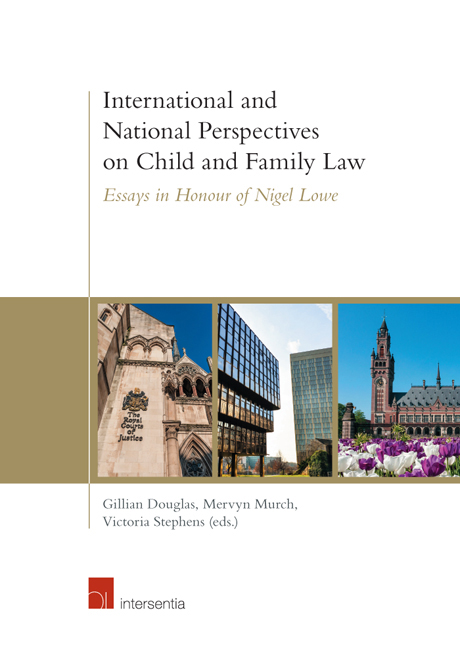Book contents
- Frontmatter
- Foreword
- Acknowledgements
- Contents
- List of Cases
- List of Contributors
- Introduction: Nigel Vaughan Lowe: An Appreciation
- Part I Family and Child Law in England and Wales
- Part II International Family Law
- Judging Parental Child Abduction: What Does it Mean to Adopt a Children's Rights-Based Approach?
- Judicial Activism: A 20-Year Evolution
- Globalisation of Adjudication in International Family Law: Serving International Families by Producing International Solutions
- Creating International Families: Private International Law and the Industry of Parenthood
- Issues in International Divorce Cases
- Non-Judicial Divorce in France: Progress or a Mess?
- The Istanbul Convention: Is Domestic Abuse Violence Against Women?
- Nationality and Migration Status in International Children's Law
- The Development of Child Protection Across International Borders for Children at Risk of Harm
- Nigel Lowe and International Family Law: An Immense Contribution
- The Spanish Constitutional Court and Protracted Child Abduction Proceedings: Time is of the Essence
- Non-Recognition of Child Marriages: Sacrificing the Global for the Local in the Aft ermath of the 2015 ‘Refugee Crisis’
- Juvenile Justice in Bulgaria: Reforms and Resistance
- Overriding Mandatory Provisions in EU Family Law Regulations
- Part III The Future for Family and Child Law
Issues in International Divorce Cases
from Part II - International Family Law
Published online by Cambridge University Press: 12 October 2018
- Frontmatter
- Foreword
- Acknowledgements
- Contents
- List of Cases
- List of Contributors
- Introduction: Nigel Vaughan Lowe: An Appreciation
- Part I Family and Child Law in England and Wales
- Part II International Family Law
- Judging Parental Child Abduction: What Does it Mean to Adopt a Children's Rights-Based Approach?
- Judicial Activism: A 20-Year Evolution
- Globalisation of Adjudication in International Family Law: Serving International Families by Producing International Solutions
- Creating International Families: Private International Law and the Industry of Parenthood
- Issues in International Divorce Cases
- Non-Judicial Divorce in France: Progress or a Mess?
- The Istanbul Convention: Is Domestic Abuse Violence Against Women?
- Nationality and Migration Status in International Children's Law
- The Development of Child Protection Across International Borders for Children at Risk of Harm
- Nigel Lowe and International Family Law: An Immense Contribution
- The Spanish Constitutional Court and Protracted Child Abduction Proceedings: Time is of the Essence
- Non-Recognition of Child Marriages: Sacrificing the Global for the Local in the Aft ermath of the 2015 ‘Refugee Crisis’
- Juvenile Justice in Bulgaria: Reforms and Resistance
- Overriding Mandatory Provisions in EU Family Law Regulations
- Part III The Future for Family and Child Law
Summary
INTRODUCTION
Freedom of movement within an area of freedom, security and justice is one of the political pillars of the European Union and underpins its regime of Regulations. But international mobility of individuals and families is by no means confined to the European Union: it is worldwide. Many ‘international’ families have links to more than one country, whether within the EU or without. Against the background of high rates of marriage breakdown, the mobility of individuals and their families has posed considerable challenges for the rules of private international law. Clear jurisdictional rules on access to courts are required and the reciprocal recognition and effective enforcement of orders between countries is of vital importance.
Both EU law and national law within the UK jurisdictions have responded to the challenge. This chapter will address recent developments and current issues in rules on international jurisdiction and the recognition and enforcement of orders in divorce and ancillary financial matters. In addition to issues which have arisen to date, the UK now faces the immense legal challenges posed by the process of exiting the EU. The European Union (Withdrawal) Bill published on 13 July 2017 gives rise to many issues of constitutionality and interpretation, and it will no doubt be subject to close scrutiny and lively debate in both Houses of Parliament. The Bill's implications in the field of divorce and ancillary matters will be addressed in this chapter, albeit that a high degree of speculation is inevitable at the time of writing.
JURISDICTION IN DIVORCE
Developed legal systems require connecting factors as the prerequisite for an individual's access to courts. Subject to provisions enabling prorogation (choice of court), the connecting factors embodied in jurisdictional rules are underpinned by the policy of deterring ‘forum-shopping’, and divorce law is no exception. Neither EU law nor the domestic laws of UK jurisdictions permit prorogation of jurisdiction for divorce. Jurisdictional rules for divorce are based on the principle of a genuine connection between an individual and the country of which the courts are invoked. Rules must strike a balance between the flexibility required by family mobility and the need for legal certainty.
The jurisdiction of a court to entertain a divorce petition is stated in section 5(2) of the Domicile and Matrimonial Proceedings Act 1973.
- Type
- Chapter
- Information
- International and National Perspectives on Child and Family LawEssays in Honour of Nigel Lowe, pp. 179 - 192Publisher: IntersentiaPrint publication year: 2018



